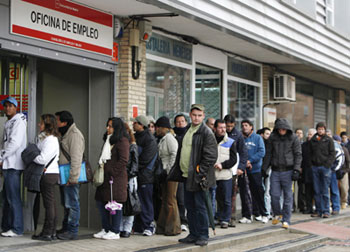Crisis strains ‘unity’
of capitalist Europe
Rulers foist burden on working people
 |
| Reuters/Paul Hanna |
| Unemployment line in Madrid, Spain. Government recently announced plans to end benefits for long-term unemployed as official jobless figures soar over 20 percent. |
BY DOUG NELSON
A financial crisis is cascading throughout the weakest economies of the eurozone, the 16 countries bonded by a common currency. The propertied rulers of Europe have thus far responded by foisting massive government debt on the most indebted countries in idle hope of stemming a broader crisis whose consequences will not be confined to the continent.
Meanwhile, it has become increasingly obvious that a united capitalist Europe is a myth, as the unfolding world depression brings to the fore conflicting interests among competing powers. And economic disparities within the eurozone and broader European Union are widening, despite the old promise that the union would even these out. The capitalists and their governments in Europe remain unified on one front alone—their intention to make working people bear the brunt of the crisis.
For years the EU provided countries with lower levels of productivity and economic development such as Greece, Ireland, Spain, and Portugal with cheaper credit than their economies would otherwise allow. This resulted in faster development of industry, agriculture, and construction. It also accelerated the growth of a massive financial bubble, particularly in real estate. Today they are shackled with unpayable debt burdens, while having lost any trade advantage that a separate weaker currency could provide. Unemployment in Ireland has more than tripled over the last decade.
Like the Greek government earlier this year, the government of Ireland recently agreed to take out massive “bailout” loans from a 750 billion euro fund set up earlier this year by the European Union and International Monetary Fund (1 euro=US$1.32). Together, the two governments borrowed some 200 billion euros to shore up banking systems on the verge of collapse.
Banks in the strongest economies of Europe—Germany, United Kingdom, and France—have a major stake in the move, themselves concerned about losing hundreds of billions of euros in outstanding Greek and Irish debt marked as assets on their balance sheets. The stronger economies have also become dependent on the union for export trade as their home markets shrink under the capitalist crisis of overproduction.
As a condition for the new loans, the governments of Greece and Ireland moved to impose deep-going austerity measures on working people, cutting wages, reducing retirement, gutting social programs, and raising taxes. The moves are designed to assure creditors that the large sovereign debts assumed by the governments are worth something.
As long as they keep the euro, Athens and Dublin can’t depreciate their currencies in an effort to stimulate investment and exports—a move that would carry its own ruinous consequences for working people and the economy. Locked into declining gross domestic product, rising interest rates, and mounting debt, the government austerity measures not only immediately degrade the lives of workers, but themselves further depress the two economies, meaning that the assault on the working class has just begun.
Mounting debt in Portugal, Spain
A similar financial crisis appears unavoidable in Portugal and Spain, the latter with an economy nearly three times the size of Ireland and Greece combined. The two governments need to come up with some 700 billion euros in the next few years to cover their deficits and bond payments.
The government of Spain, where unemployment has topped 20 percent, announced cuts to wages, pensions, and health care in May as it sought to assure the owners of its mounting sovereign debt.
“Spain isn’t going to have to tap any EU fund,” Socialist prime minister José Luis Rodríguez Zapatero sought to convince investors in a December 2 interview with CNBC. A day earlier he announced plans to sell off the country’s airport authority and lottery to pay down debt and pledged to end unemployment compensation for the long-term jobless. The Cabinet decided December 3 to raise 780 billion euros through increased tobacco taxes.
Meanwhile, European government officials are wrangling over how to approach the inevitable.
Already the European Central Bank itself has begun buying sovereign debt from the governments of Ireland and Portugal, according to Reuters, but the amounts are not public. At a December 6 meeting of European finance ministers in Brussels, a number of government representatives, backed by the IMF, pressed to increase bailout measures to shore up the most troubled economies. Other proposals include substantially increasing the 750 billion euro loan fund in anticipation of the coming debt crises and creating eurozone sovereign bonds, issued collectively by the 16 countries that use the euro.
German chancellor Angela Merkel is leading the opposition to these proposals. Merkel, who heads the government of Europe’s strongest economy, argues for facing the destruction of debt soon rather than later. At issue is essentially how far to kick the can down the road with bailout loans before the inevitable debt “restructuring” takes place. This, however, will not only hit the pocketbooks of a substantial layer of capitalists—the mere suggestion of it has already begun to shake confidence and assumptions that lubricate the capitalist machine.
Either way, the capitalist crisis across Europe is pushing the working class to the wall and will force, out of necessity, working-class resistance.

No comments:
Post a Comment
Comments